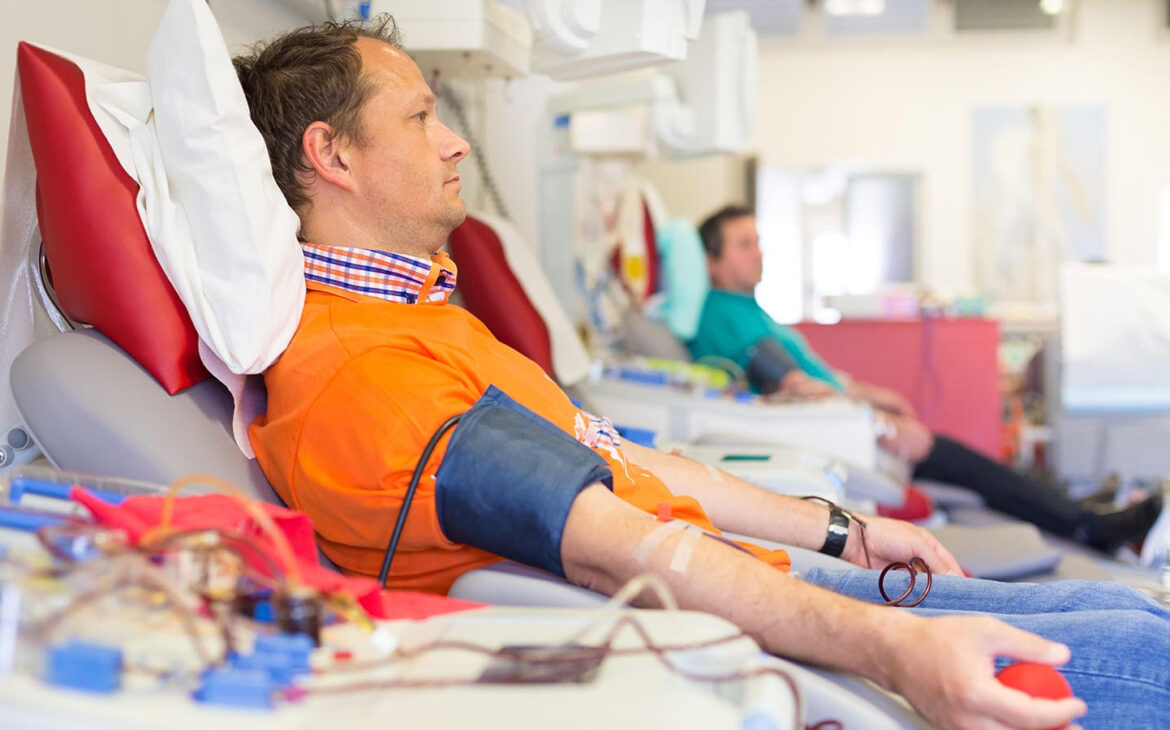Agency moves to individual risk assessment to expand blood donor eligibility
The FDA plans to relax rules that for decades have prohibited gay and bisexual men from donating blood, due to concerns about HIV transmission.
In draft guidanceopens in a new tab or windowreleased Friday, the agency recommended moving toward “individual risk-based questions that include gender” as a means of mitigating the risk of transfusion-transmitted HIV. The approach would mean that men who have sex with men could donate blood if they meet eligibility criteria, such as being in a monogamous relationship.
The agency takes its responsibility to maintain a safe blood supply very seriously, said Peter Marks, MD, PhD, director of the FDA’s Center for Biologics Evaluation and Research, during a press conference. “Today’s draft recommendations provide an opportunity to expand donor eligibility, while maintaining these responsibilities and minimizing the risk of transmitting infectious diseases.”
He called the proposed changes an “important step forward,” noting that this new approach would be “as inclusive as it can be” in light of the available science.
“This marks a monumental shift and ends a long and painful era of widespread discrimination against gay men. Eligibility to donate blood will no longer be based on sexual orientation,” Carl Schmid, executive director of the HIV+ Hepatitis Policy Institute, said in a statement following the news.
“Instead, each person, regardless of sexuality, will be individually reviewed to determine their eligibility to donate,” Schmid continued. “While this long-awaited change is based on science and facts, which have been clear for years, it is the result of the Biden administration’s leadership that continues to tear down discriminatory government policies.”
Marks explained that the proposed guidance recommends changing the current donor history questionnaire so that all potential donors of any gender are asked if they have had “new or multiple sexual partners in the past 3 months.” Those who report having had a new partner or more than one partner in this time period would also be asked to provide a history of anal sex in the past 3 months.
"All potential donors, regardless of gender identification, who report having had a new partner or more than one partner and anal sex in the past 3 months would be deferred from donation," he said.
Under questioning, Marks clarified that a person who had vaginal sex with a new partner in the past 3 months would be eligible to donate blood, but a person who had anal sex with a new partner in the past 3 months would not be, given that anal sex is linked to “an increased risk of blood exchange.”
Those who have ever tested positive for HIV, or who have taken medications to treat HIV infection, will remain "permanently deferred," he noted.
Additionally, those taking oral pre-exposure prophylaxis (PrEP) will be deferred for 3 months from their most recent dose, while those on injectable PrEP will be deferred for 2 years from their last injection, she continued.
These recommendations stem from “available data demonstrating… delayed detection of HIV by licensed screening tests for blood donations” associated with these drugs, potentially leading to false-negative results, Marks explained.
Among people taking PrEP, there is still a risk of contracting HIV, of about 1 in 100 person-years or 0.5 in 100 person-years, depending on the regimen, she added. “So until we can better determine who is at lower risk in that group taking PrEP, we need to implement this donor deferral.”
The FDA will continue to track data related to PrEP and blood donation, she said, and this may not be the agency’s “final resting place” when it comes to donor eligibility.
Another proposed change focused on people who were previously indefinitely deferred for exchanging sex for money or drugs and those with a history of non-prescription injection drug use, who may now be eligible to donate, “provided the donor meets all donor eligibility criteria.”
FDA Commissioner Robert Califf, MD, noted that “giving blood is one of several really important symbolic ways to demonstrate your care for other people. So we want to make that available to everyone in the context of a safe blood supply.”
The proposed changes are based on multiple data sources, including data from the United Kingdom and Canada, which have implemented similar policies for donor eligibility; a review of surveillance information from the Transfusion-Transmissible Infection Monitoring System; “Performance characteristics of HIV nucleic acid tests”; and data from the Assessing Donor Variability and New Concepts in Eligibility Study (ADVANCE).
The ADVANCE study, which looks at different HIV risk factors such as anal sex, found that “a significant fraction of men who have sex with only one partner should be able to donate,” Marks said, noting that the results of the study are expected to be released “in the coming months.”
Once the final guidance is issued, establishments that collect blood or blood components should update their donor education materials, donor history questionnaires and other supplemental materials, the FDA noted, and should review “product stewardship and donor requalification procedures.”
Additionally, the new guidance "will replace the guidance titled 'Revised Recommendations for Reducing the Risk of Transmission of Human Immunodeficiency Virus by Blood and Blood Products' dated April 2020, updated in August 2020," the agency wrote.

